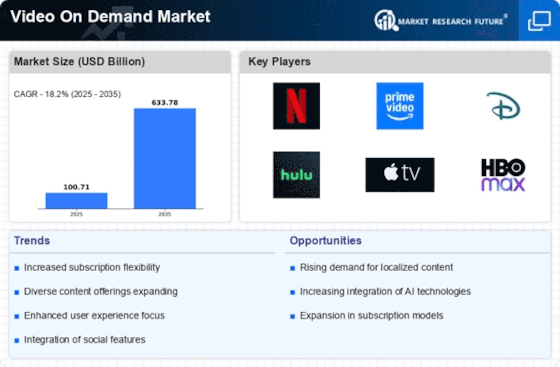Market Analysis
In-depth Analysis of Video on Demand Market Industry Landscape
One of the primary drivers of the Video on Demand market is the widespread adoption of high-speed internet and the proliferation of connected devices. With the increasing availability of broadband and the ubiquity of smartphones, tablets, smart TVs, and other internet-connected devices, consumers now have unparalleled access to on-demand video content. This has fueled the rise of streaming services, allowing users to watch their favorite shows, movies, and original content whenever and wherever they choose. Technological innovation is at the forefront of the market dynamics for Video on Demand. The evolution of video compression technologies, streaming protocols, and content delivery networks has led to a seamless streaming experience, even in high-definition and 4K resolutions. Additionally, advancements in user interfaces, recommendation algorithms, and interactive features contribute to a personalized and engaging viewing experience. As technology continues to progress, the industry is exploring new frontiers, such as virtual reality (VR) and augmented reality (AR), to enhance the immersive nature of on-demand content. The competitive landscape of the Video on Demand market is marked by a plethora of streaming platforms, each vying for subscribers and viewer attention. Global giants, such as Netflix, Amazon Prime Video, Disney+, and Hulu, compete with regional and niche players, creating a highly competitive environment. Original content production has become a key battleground, with platforms investing heavily in exclusive shows and movies to attract and retain subscribers. The ongoing battle for content rights and exclusive deals further intensifies the competition among these platforms. Consumer behavior and preferences play a pivotal role in shaping the market dynamics of Video on Demand. The shift from traditional cable and satellite TV to on-demand streaming reflects changing viewing habits, with audiences preferring the flexibility and convenience of choosing what to watch and when. The rise of cord-cutting, where consumers abandon traditional TV subscriptions in favor of streaming services, underscores the increasing influence of on-demand content consumption. Understanding these evolving preferences is essential for streaming platforms to tailor their content libraries and user interfaces to meet the demands of diverse audiences.


















Leave a Comment